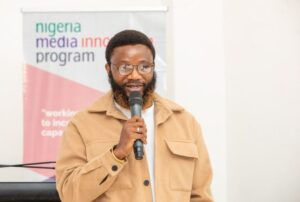Re-inventing journalism in Nigeria: The need for conscious media career development in Nigeria
50th Birthday Lecture by Lekan Otufodunrin, Managing Editor, Online, The Nation Newspaper delivered on May 9, 2014 at Nigeria Institute of Journalism, Ogba, Lagos.
When I announced my birthday lecture on Facebook last week, I got numerous comments from my friends. While I clicked like for all the responses which were mainly greetings wishing me well on the celebration, I responded to only one from Ayodele Ajadi of the Federal Road Safety Commission, FRSC.
Apparently surprised that I was just clocking 50, he asked how old I was when I was an intern at the defunct National Concord Newspapers in 1984 when he first knew me.
Of course, my response was that I was 20 years old then when I was a student of Mass Communication at the University of Lagos. So if I was 20 in 1984, I should be 50 in 2014. Some claim I don’t look 50, others are surprised that I am just clocking 50. I am indeed 50 and thank almighty God for sparing my live.
I return all the glory and honor to God, to Him alone be all the praise and adoration.
More than anything, Ajadi’s question reminded me of my first experience working in a newspaper house.
I still remember some other intern then including Waheed Odusile of The Nation, Tunde Fabunmi, a columnist with The Punch and Kola Ojelabi of LAMATA.
I remember how excited I was seeing my first byline in the paper. The day I got to a newsstand and saw that my story was the lead story I was so proud of myself that I wanted to tell some of the members of the free readers association around that they are privilege to have the writer of the story some of them were reading in their midst.
The three months plus experience in many ways prepared me for what has turned out to be my long sojourn in Journalism which from every indication will not end soon. However one aspect of my journalism career which by God’s grace I intend to give more attention is media career development.
Over the years, I have benefitted and been involved in one form of media career initiative or the other and I feel a compelling need to scale up my work in this area. While many other professional groups are making conscious efforts to develop the capacity of their members with organized structures for continuos education on the job and career support, not enough is being done in the media.
Right from media training institutions for those who have the opportunity to attend one, to the various media houses there is a yearning gap for the implementation of well articulated media industry relevant training and career support for journalists.
I acknowledge that there are indeed some efforts being made but what we need is a coordinated approach to ensuring that journalists are well trained in media training institutions. That some Mass Communication students graduate these days and don’t have what it takes to work in a media house is a reflection of the quality of training they are getting and how obsolete the curriculum is.
There is need for a well defined working relationship between media training institutions and media organisations. If the graduates are being produced to work in media organisations, the training institutions should work with the employers to produce the right quality of graduates.
This will be possible if the lecturers regularly upgrade their knowledge and also observe part of their sabbatical in media houses. Journalism is a practical job and only those who have practiced the art can effectively teach and inspire young graduates to become outstanding journalists.
Media organisations and individuals should show more than passing interest in helping to train up-coming journalist. We should volunteer to teach some courses.
Won’t it be nice if during Nigeria Union of Journalists, NUJ Week observed annually members visit media training institutions and teach for some hours on various courses and give the students the benefit of their experience?
We should not wait to be invited by the students like they struggle to do every year.
It’s the least we can do to invest in the future of the profession.
Nigeria media training instructions should also learn from the model in many developed countries where they have Media Career Services department manned by professionals who guide and mentor the students throughout their course and stay in touch with them after graduation.
Beyond the initial certification, the dynamic nature of media work requires that there should be regular on the job training for journalists based on need assessment of the various categories of staff.
I dare say that regular training is not a top agenda, if it is at all, of most media organisations in the country. We are so focused on the daily round of production that we think that regular training is a distraction. It is said that insanity is doing the same thing the same way and expecting a change. It is no surprise that in some instances we can’t claim to be making much progress beyond the technology.
I don’t know how many media houses budget or training of their staff. Some media houses have Training Managers, but in some instances such positions are ‘Siberia’ postings, if you know what I mean.
My experience is that we have largely abandoned training of journalists to Media Non Governmental Organisations, who understandably have their own agenda and focus. NGO trainings unfortunately do not cover many area of media coverage. Most times, they are in the areas of Health, Human Rights and a few others.
Surprisingly, even when free trainings are organized for journalists some managers are either not interested in allowing their staff to attend or the journalists themselves don’t take maximum advantage of the opportunities.
One possible excuse which is even not tenable is lack of funds since many media organisations are finding it difficult to pay salaries, but how do we explain that we employ young journalists and don’t give them basic orientation like it’s done in other sectors.
The defunct Daily Times had a training School for new and old staff. Radio Nigeria still has a training school in Lagos which I am not sure has the capacity to meet the demands of modern broadcasting. There is also the old TV College in Jos.
By now we should have had more training schools better equipped, better staff to cater for the boom in the media industry.
While media organisations have the obligations to train their staff, individual journalists as professionals should also invest in their own career. Our career is about our life and the progress we make should not be limited by only the support we get from our media houses.
Journalists should like other professionals take personal responsibility for to become better on their job. If artisans buy their tools, I don’t know why some journalists will refuse to buy simple gadgets to improve on their productivity and wait for their employers to buy for them.
I am not aware that employers pay for most ICAN, NIPR, APCON courses that that staff are supposed to acquire, yet the concern staff dutifully enroll for the courses.
Using the popular definition of Public Relations, journalists should have a deliberate planned and sustained career plan. We should have a mission statement and goal.
A career is like a journey and unless it is planned it will be an aimless one than will amount to nothing no matter how long we are on the job. Like someone said, if you don’t know where you are going, everywhere you get to we look like your destination.
For too long many of us have carried on as if we are engaged in a lesser profession or even a trade which some claim journalism is. Journalism and other media work are too important for any professional to be a mediocre.
It is not difficult to have structured programmes for continuous education for as many journalists as possible. What the industry leaders need is the will and the commitment to provide an enabling environment to improve the cavity of journalists.
At Media Career Development Services which I initiated some years ago, we have experimented with many options, including a yearly Young Journalists Conference.
Recently we came up with a three level Media Career Development Course made up of the Basic, Advanced and Senior Media Career programme.
Last Wednesday we launched the Basic course attended by 16 young journalists and media professionals. From the feedback we got, many more young journalists will benefit from such training.
We plan to partner with the NUJ, NGE and other media groups to hold this programme which seeks to address an important aspect of required media training in the country.
The task to reinvent journalism practice in Nigeria is a task that must be urgently done and we all have individual and collective roles to play.
I want to thank all organisations that have supported our work in media career development over the years including the NUJ, NGE, International Press Centre, Journalists Against AIDS, Media Rights Agenda, NIJ, Media Mentors, Journalism Clinic, Journalists For Christ, The Punch, The Nation, Pastor Ayo Oritsejafor, Posterity Media and many others.
I am glad that our efforts have not being in vain and together we can take journalism practice to a higher level.
Thanks for listening




